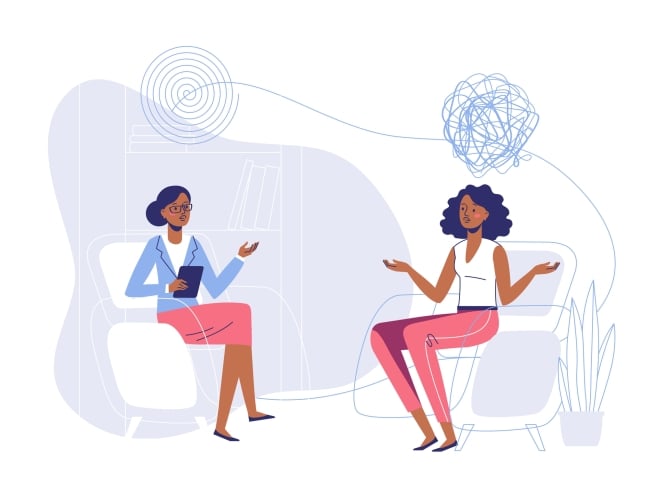You have /5 articles left.
Sign up for a free account or log in.

Conversations during an academic advising session may lead to a referral to other resources on campus, such as counseling or career advising.
bluebearry/iStock/Getty Images Plus
An advisee recently approached Montclair State University’s Angy Estrada, expressing doubts about her ability to remain at the New Jersey institution. During the session, the student asked questions about her curriculum, sharing her disinterest and difficulty in current courses as well as her feelings of loneliness, because her academic challenges were impacting friendships as well.
Estrada, an academic adviser, asked the student what she wanted to accomplish in life—to think about who she is and what her purpose is. “Those questions were a new way to engage her attention and [help in] finding her own answers,” she recalls. First-year students in particular, Estrada adds, don’t always know “how to articulate and explain well their academic and/or personal needs.”
Estrada views her sessions as opportunities to learn more about how students are doing, both academically and in their college experiences. “Advising sessions should be a safe space to talk to someone who knows their academic progress,” she says.
Following are six best practices involving active listening and engagement that Estrada has found are effective in her sessions.
- Be attentive during introductions. This means listening to the student’s name and its pronunciation as well as preferred pronouns, which Estrada says are as important as learning about a student’s academic goals. In addition, she will ask students about their interests and why they chose their major or intended career, which helps “to create a welcoming conversation … These questions can bridge the gap between conversations that are strictly about their course requirements and conversations that allow them to share their academic and personal experiences on campus.”
- Offer a safe space for advisees. “Providing a space for conversations free of judgment helps them to articulate and advocate for their professional goals, their motivations, and [to be] better prepared to become professionals in their field,” she notes.
- Ask questions of students to uncover insights. If a student is considering changing majors, for example, questions to ask could include: What type of working environment would you like for your future job? What are the skills you wish to achieve? Would you like to go into graduate school? “Reflecting upon these questions is a way to discover the student’s goals, strengths and motivation that help them to embrace their college experience,” Estrada says.
- Try different tactics when needed. Sometimes academic conversations can become difficult when the student isn’t receptive to a recommendation. Advisers can help in creating a plan of action for the student to keep academic progress on track. Setting up a future session to continue is another option. “When a student is not willing to have a civil conversation, it is crucial to provide them with sufficient time to think critically,” says Estrada, adding that facing challenges creates a lot of stress.
- Suggest other assistance. Campus partners such as financial aid, career services or counseling services can serve as assets for struggling students. “This practice benefits students as they continue their college journey, and it gives them a chance to continue building trusting relationships,” says Estrada.
- Celebrate successes. Estrada views an advisee booking sessions on their own as a sign that her work is effective. It’s an indication the student is being proactive about academic responsibilities and bringing in questions about their academic journey. Such interactions are, she says, “an excellent way to find out how to best advocate for [students] and successfully teach them to advocate for themselves.”
Estrada’s recent session with the student considering dropping out wound up eventually becoming a moment to celebrate. The conversation that day evolved into Estrada mentioning other campus resources and putting that information in an email along with a request to follow back up afterward. And in that follow-up advising session, the student shared that she had spoken to a professor, done her own research, met with a career adviser about changing her major and discussed it all with her mother.
“She wanted to have a conversation with me about her course requirements and ways to move forward,” says Estrada. “She did not bring up wanting to quit school.” Together, they designed an academic plan and the student left “clearly very excited about her new decision.”
Academic advisers: Tell us about one or more of your most memorable student interactions (identifying details omitted). Share here.








